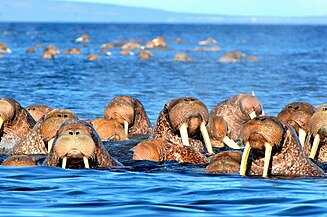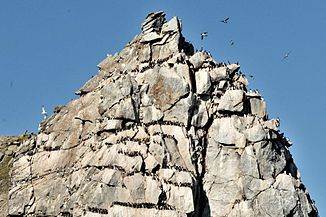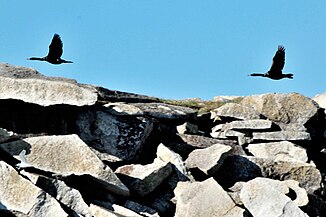Kolyuchin Island

 Kolyuchin Island | |
 Location of Kolyuchin Island | |
| Geography | |
| Coordinates | 67°28′N 174°37′W / 67.467°N 174.617°W |
| Length | 4.5 km (2.8 mi) |
| Width | 1.5 km (0.93 mi) |
| Administration | |
| Demographics | |
| Population | 0 |
Kolyuchin Island or Koliuchin Island (Russian: Остров Колючин, Chukot: Кувлючьин, romanized: Kuvlyuch'in) is a small island in the Chukchi Sea. It is not far from the coast, being only 11 km (6.8 mi) from the northern shore of the Chukotka Peninsula. Its latitude is 67° 28' N and its longitude 174° 37' W.
This island is 4.5 km (2.8 mi) in length and its maximum width is 1.5 km (0.93 mi). It is covered with tundra vegetation. There was a small Chukchi settlement on the southern end of the island called Kolyuchino but as of 1987, there was no village and very rare traces of former human presence such as separate logs and coals.[1]
On the nearby shore there is the settlement of Nutepel'men, located north of the Rypatynonel'gyn Lagoon and south of the Pyngopil'gyn Lagoon. Kolyuchinskaya Bay, further south, is named after Kolyuchin Island. Administratively this island and its surrounding area belongs to the Chukotka Autonomous Okrug of the Russian Federation.
Etymology
[edit]The Russian name of the island comes from a corruption of the Chukchi word Кувлючьин (Kuvlyuch'in) – "round". In the Chaplino dialect of the Central Siberian Yupik language its name is Кулусик (Kulusik) – "separate ice floe".[2] When the island was visited by James Cook during an expedition, he named it Burney's Island.[3]
History
[edit]In September 1933 Soviet ice-breaker Chelyuskin got crushed by pack ice near Kolyuchin Island. The passengers and crew were rescued by air in a dramatic and much publicised operation which made heroes of Captain Vladimir Voronin and expedition leader Otto Schmidt.
In 1943 a polar research station was transferred from Cape Dzhenretlen to the western part of the island, staffed by 3-4 people by the late 1980s. The last director of the station, Alexey Spasskin, launched an amateur radio service from the island in 1989 with the call name УЖ1ПОЛ/УА10 and the callsign АС65. The station was ultimately closed in February 1992.[4][5]
|
See also
[edit]References
[edit]- ^ "Habitation". vasylprydatko.org.ua. Archived from the original on 18 March 2012. Retrieved 12 August 2018.
- ^ Леонтьев В. В., Новикова К. А. Топонимический словарь Северо-Востока СССР / науч. ред. Г. А. Меновщиков; ДВО АН СССР. Сев.-Вост. комплекс. НИИ. Лаб. археологии, истории и этнографии. — Магадан: Магад. кн. изд-во, 1989. — С. 199. — 456 с. — 15 000 экз. — ISBN 5-7581-0044-7
- ^ Врангель Ф. П. (1948). Путешествие по северным берегам Сибири и по Ледовитому морю. Издательство Главсевморпути. (in Russian)
- ^ "Остров дает позывной (Людмила Зыбцева) / Проза.ру". proza.ru (in Russian). Retrieved 2022-02-08.
- ^ АО, полярная станция Остров Колючин Тип объекта: Города Месторасположение: Чукотский; Рейтинг: 4.7778, Россия Охраняемость: нулевая Состояние: аварийное. "полярная станция Остров Колючин (Чукотский АО) / Города". urban3p.ru (in Russian). Retrieved 2022-02-08.
{{cite web}}: CS1 maint: numeric names: authors list (link)
External links
[edit]- Armstrong, T., The Russians in the Arctic, London, 1958.
- Early Soviet Exploration: [1]
- History of Russian Arctic Exploration: [2]
- Pictures of animals in Kolyuchin Island: [3]
- Prydatko-Dolin V. Kolyuchin Island Landscapes. My Arctic-in-Art, 2010 (Rus.): [4]






